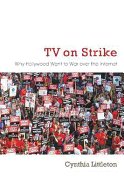
In November 2007, the Writers Guild of America brought much of Hollywood's television production to a standstill with a strike that lasted roughly three months. As Variety TV correspondent Cynthia Littleton describes the core of the WGA's dispute with the Alliance of Motion Picture and Television Producers, the writers wanted to be paid when the studios sold or streamed their shows over the Internet--they hadn't gotten the best of deals when they had a similar dispute over home video distribution back in the '80s, and many of them were itching to right the balance.
TV on Strike is a play-by-play account of the strike's origins and the ebb and flow of the negotiations between the WGA and the AMPTP. Littleton is at her best when she's got behind-the-scenes revelations about the personal drama, like the animosity studio heads felt toward the WGA's leadership--and the growing realization among other top writers in the Guild that they probably did need someone else handling their end of the discussions. There's also a lot of juicy material about tensions between the WGA and Jay Leno, who brought his show back on the air in the midst of the strike but seemed to draw more fire than other late-night hosts who did likewise. (David Letterman, who owns Late Night outright, cut a separate deal with the Guild.) As for the financial issues involved, Littleton observes this strike was likely just "the first act in a high-tension drama" we'll come back to again, as writers and producers continue to adapt to their shifting technological playing field. --Ron Hogan, founder of Beatrice.com

